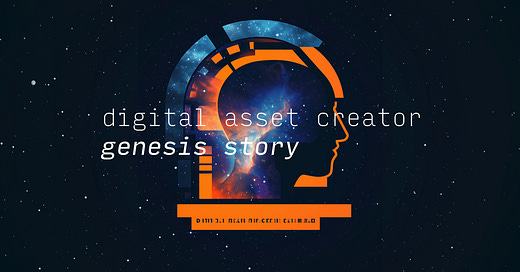Digital Asset Creator - Genesis Story
A white paper addressing the slow progress in the adoption of tokenization, despite its frequently touted benefits proposing a Multimodal Trust Framework as a solution.
Tokenization has been heralded as a transformative force in finance, offering the promise of unparalleled liquidity, efficiency, and accessibility. Yet, despite this potential, its adoption has largely stalled. Outside niche segments, tokenization faces significant hurdles in addressing the practical, structural, and systemic gaps entrenched in today’s financial systems. These challenges demand a fundamental rethinking of trust, functional gaps, and the underlying market structure.
Why Tokenization Hasn’t Taken Off
The transition from ”what could be” to ”what is” remains elusive. Tokenization’s theoretical promise far outpaces its practical application, with the vision of ”peer-to-peer finance” hampered by legal constraints, legacy systems, and the inability to seamlessly integrate tokenized assets into existing infrastructures.
Paradoxically, the very factor limiting blockchain’s broader adoption—its inability to natively verify exogenous data—is also the root cause of inefficiency and cost in traditional financial systems. This fundamental, yet often overlooked irony, underscores both the limitations and transformative potential of tokenization as a mechanism for rethinking trust and information in financial networks.
The Case for a Radical Rethink
Integration with Crypto: Native crypto assets like Bitcoin and Ethereum exemplify functional decentralization. Their programmability and autonomy provide critical insights for reshaping traditional finance.
Governance Transformation: The success of tokenization lies in decentralized modular services, composability, and a redefinition of value and control within distributed networks. Tokenization must be understood as a technology-led transformation, not merely a technical upgrade.
The Multimodal Trust Solution: This paper introduces a framework that addresses tokenization’s core challenge: reconciling real-world data’s inherent uncertainty with blockchain’s deterministic nature. Without resolving this disconnect, automation through smart contracts in distributed systems cannot achieve its full potential.
Practical Realities and Persistent Barriers
Even with a reimagined framework, challenges persist. Scalability issues, tiered holding structures, and the reconciliation of centralized and decentralized models remain significant obstacles. Unlocking tokenization’s potential demands technological innovation, regulatory alignment, and a systemic redesign of financial processes.
Enriching Perspectives
To provide a deeper understanding, each chapter of this paper begins with a narrative—drawing from history, philosophy, and art—to frame the discussion (video). These stories encourage critical reflection on tokenization, trust, and the evolving nature of truth in the digital age.
Download the paper here
Listen on Apple Music or Spotify.



